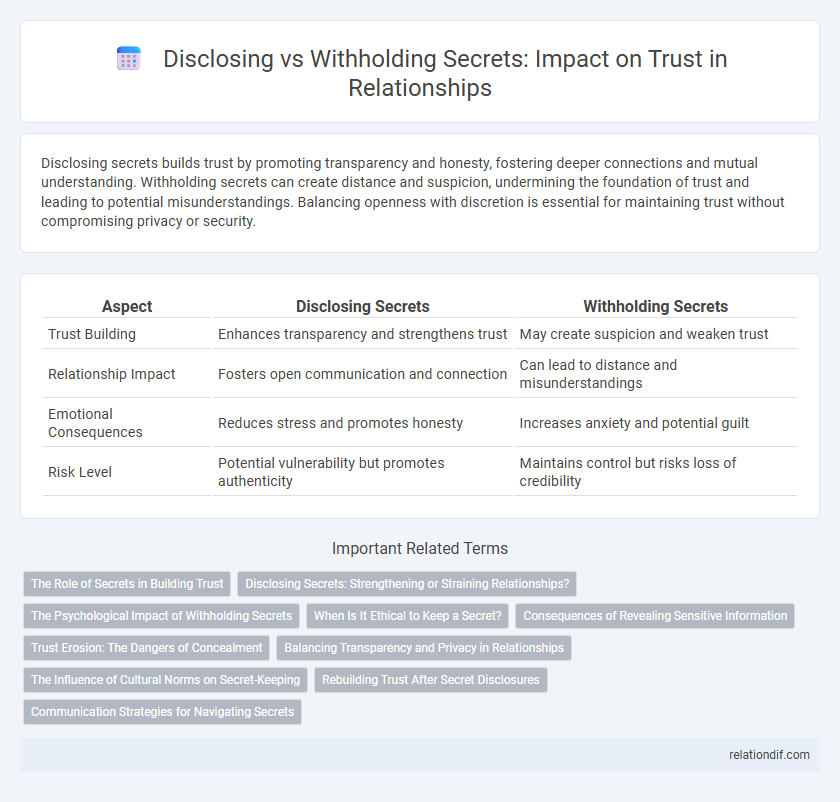Disclosing secrets builds trust by promoting transparency and honesty, fostering deeper connections and mutual understanding. Withholding secrets can create distance and suspicion, undermining the foundation of trust and leading to potential misunderstandings. Balancing openness with discretion is essential for maintaining trust without compromising privacy or security.
Table of Comparison
| Aspect | Disclosing Secrets | Withholding Secrets |
|---|---|---|
| Trust Building | Enhances transparency and strengthens trust | May create suspicion and weaken trust |
| Relationship Impact | Fosters open communication and connection | Can lead to distance and misunderstandings |
| Emotional Consequences | Reduces stress and promotes honesty | Increases anxiety and potential guilt |
| Risk Level | Potential vulnerability but promotes authenticity | Maintains control but risks loss of credibility |
The Role of Secrets in Building Trust
Disclosing secrets fosters trust by demonstrating transparency and vulnerability, which deepens emotional connections between individuals. Withholding secrets can protect privacy but may also create barriers to trust if perceived as deceit or exclusion. The balance between sharing and discretion is crucial for maintaining mutual respect and understanding in relationships.
Disclosing Secrets: Strengthening or Straining Relationships?
Disclosing secrets can strengthen relationships by fostering transparency, building trust, and enhancing emotional intimacy between individuals. However, revealing sensitive information may also strain relationships if confidentiality is breached or if the secret causes hurt or misunderstanding. The impact depends on the context, the nature of the secret, and the trust level already established between the parties involved.
The Psychological Impact of Withholding Secrets
Withholding secrets often leads to increased stress and anxiety due to the mental burden of concealment, which can negatively impact emotional well-being. This psychological strain can cause feelings of guilt, shame, and decreased self-esteem, disrupting interpersonal relationships and fostering emotional isolation. Studies in clinical psychology reveal that prolonged secrecy is linked to elevated cortisol levels and impaired cognitive functioning, highlighting the deep-rooted impact on mental health.
When Is It Ethical to Keep a Secret?
Keeping a secret is ethical when it protects an individual's privacy, upholds confidentiality agreements, or prevents harm to others. Disclosing secrets becomes necessary when withholding information could result in significant injury, legal violations, or breaches of moral responsibility. Ethical decision-making balances the potential consequences of disclosure against the respect for trust and autonomy inherent in secrecy.
Consequences of Revealing Sensitive Information
Revealing sensitive information can severely damage trust, as betrayal often leads to emotional hurt and broken relationships. The disclosure of secrets risks creating long-term reputational harm and legal repercussions for both individuals and organizations. Maintaining confidentiality preserves trust, ensures privacy, and fosters stronger interpersonal and professional bonds.
Trust Erosion: The Dangers of Concealment
Concealing secrets undermines trust by creating doubt and suspicion within relationships, leading to a gradual erosion of confidence and openness. Research shows that withholding critical information increases emotional distance and can provoke feelings of betrayal, significantly damaging interpersonal bonds. Transparent communication fosters trust, while persistent concealment damages relational stability and long-term connection.
Balancing Transparency and Privacy in Relationships
Balancing transparency and privacy in relationships requires careful consideration of the impact that disclosing secrets or withholding information can have on trust. Sharing sensitive information fosters openness and strengthens emotional bonds, while maintaining discretion preserves personal boundaries and respects individual privacy. Effective communication and mutual understanding are essential to navigate this delicate equilibrium, ensuring trust is built without compromising personal integrity.
The Influence of Cultural Norms on Secret-Keeping
Cultural norms significantly shape approaches to disclosing or withholding secrets, with individualistic societies often valuing transparency and open communication, while collectivist cultures prioritize harmony and discretion. In collectivist settings, secret-keeping is frequently regarded as a mechanism to maintain social cohesion and avoid conflict, influencing trust dynamics within relationships. Understanding these cultural influences is essential for navigating trust and managing secrets effectively across diverse social contexts.
Rebuilding Trust After Secret Disclosures
Rebuilding trust after secret disclosures requires consistent transparency and sincere accountability to repair the emotional breach. Establishing open communication and demonstrating reliability over time helps restore confidence and fosters a safe environment for vulnerability. Prioritizing empathy and commitment to change accelerates the healing process between parties affected by the breach of trust.
Communication Strategies for Navigating Secrets
Effective communication strategies for navigating secrets emphasize transparency balanced with discretion to maintain trust. Employing active listening and empathetic responses helps create a safe environment where sensitive information is handled respectfully. Clear boundaries and mutual understanding about what to disclose or withhold prevent misunderstandings and strengthen relational trust.
Disclosing secrets vs withholding secrets Infographic

 relationdif.com
relationdif.com